TANZANIA
Health as a fundamental human right

Smiling elderly African lady using her phone.
© ShutterstockWhat does attaining a high standard of health mean?
In July 1946 WHO constitution was signed, declaring health as a right. “The enjoyment of the highest attainable standard of health is one of the fundamental rights of every human being without distinction of race, religion, political belief, economic or social condition” it says. 76 years later, how much of this declaration is realised? Attaining a high standard of health means; access to healthcare for all in a timely acceptable and affordable manner. It also means that basic and social determinants of health such as availability of safe water, food, housing, sanitation, gender equality, education, violence, income, and public health resources must be achieved.
Mariatheresa S. Kadushi lived in East Africa for over 20 years where she recalls that neither access to healthcare nor social determinants of health were met for the majority of the population. Healthcare was never a fundamental right but a luxury for the few who could afford it. To realise the “health as a human right” goal, there is a need to take two major steps;
- Focus on “health” first and not only healthcare (curative medicine). 10% of what determines a person’s health depends on a medical facility (hospital); 90% is shaped by one’s lifestyle, behaviours & quality of life.
- Invest in the largest asset of a country like Tanzania; which is its people (Of whom 60% are under 25 years of age).
To disrupt the public health sector in Tanzania and other countries in East Africa, young innovators like Mariatheresa Kadushi, her partner Dr. Hilderruth and their team took the first step and created a public health platform where people can access health information and medical care on their mobile phones.
Mobile phones are the number one item present in almost every household in Tanzania and are small enough to fit in a small wallet. Technology has allowed people, regardless of their social status, to communicate with family and friends miles away, get financial services from the comfort of their homes and receive news and information instantly at their fingertips. Building on this advancement, in 2019 we launched Mobile Afya (mHealth), the first application in Africa using internet-free mobile technology (USSD) to provide basic health information and education in local and native languages starting with Swahili in East Africa. In addition to health information, people can call doctors and ask questions or seek consultation about their health and well-being.
Mobile Afya App

Mobile Afya is the first application in Africa using internet-free mobile technology (USSD) to provide basic health information and education in local and native languages starting with Swahili in East Africa.
© Mobile AfyaThe focus of Mobile Afya (mHealth) is:
- Prevention — Helping people not fall sick by giving them access to public health knowledge and tools.
- Literacy — Equipping women and local communities with the knowledge to make informed health decisions.
- Innovation — Enabling access to medical doctors and information using simple and easy-to-use mobile technology.
Innovations in health are a barrier breaker, they make it possible for everyone to access both preventative and curative care in an affordable and timely manner. They create progress towards ensuring that “health” becomes a human right for all.
African Start-Ups and German SMEs: It’s a MATCH?
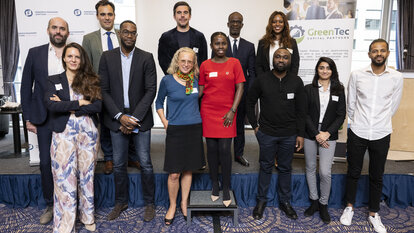
Group photo of all the speakers at the ‘African Start-Ups and German SMEs: It’s a MATCH?’ event. [Slide right to see more photos]
© Friedrich Naumann Foundation for Freedom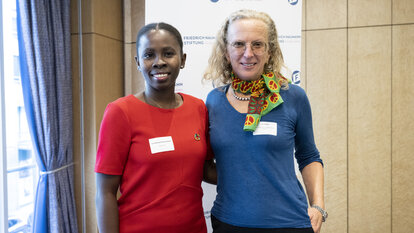
Mariatheresa S. Kadushi with FNF Africa regional director Inge Herbert at the ‘African Start-Ups and German SMEs: It’s a MATCH?’ event.
© Friedrich Naumann Foundation for Freedom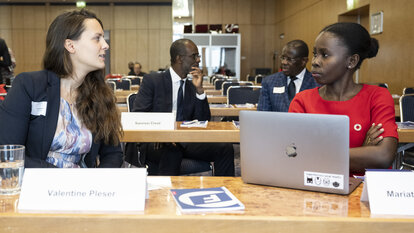
Mariatheresa S. Kadushi together with a participant at the ‘African Start-Ups and German SMEs: It’s a MATCH?’ event.
© Friedrich Naumann Foundation for Freedom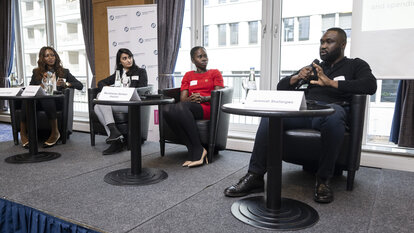
Mariatheresa S. Kadushi on a panel at the ‘African Start-Ups and German SMEs: It’s a MATCH?’ event.
© Friedrich Naumann Foundation for Freedom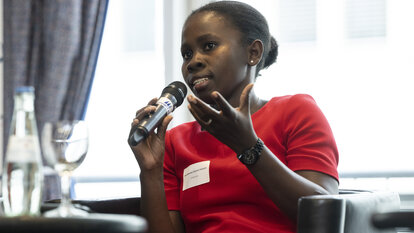
Mariatheresa S. Kadushi speaking as a panelist at the ‘African Start-Ups and German SMEs: It’s a MATCH?’ event.
© Friedrich Naumann Foundation for Freedom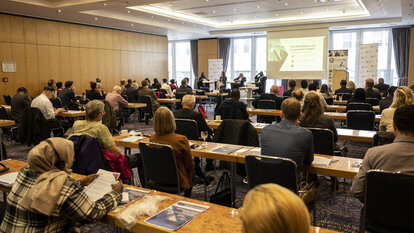
‘African Start-Ups and German SMEs: It’s a MATCH?’ event in September 2022.
© Friedrich Naumann Foundation for FreedomAfrican Start-Ups and German SMEs Meet
This was one of the points discussed at the recent ‘African Start-Ups and German SMEs: It’s a MATCH?’ event. The event, organised by GreenTec Capital Africa Foundation in collaboration with Friedrich Naumann Foundation for Freedom, Enpact, Berlin Partner für Wirtschaft und Technologie GmbH, and New Mittelstand GmbH brought together diplomats, business leaders, academia, politicians, non-profit organisations, and stakeholders from diverse sectors including health.
The panel discussions and talks were geared toward the future of African Start-Ups and German Small and Medium Enterprises (SMEs) in exploring synergies, collaborating and doing business. Partnerships, innovations in health and investing in long-term solutions between countries that have developed like Germany; and emerging economies like Tanzania; will accelerate how far we can go in attaining some of the most important commitments we have made, in particular the “declaration of health as a fundamental human right”. With a collaborative model in mind, let’s see how far we will come in the next 76 years regarding health as a human right.